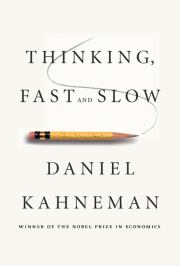 Daniel Kahneman, recipient of the Nobel Prize in Economics, is a genius in our midst.
Daniel Kahneman, recipient of the Nobel Prize in Economics, is a genius in our midst.
At seventy-eight-years-old, Kahneman has spent the majority of his life studying how the human mind makes decisions, especially their most important ones.
Leveraging a life’s work of research, in his new book, Thinking Fast And Slow, Kahneman concludes that, all too often, we make incredibly irrational choices – generally because we’re not sufficiently aware of how our minds work.
Kahneman tells us that we have two ways of thinking, what he’s named “System 1” and “System 2.”
“System 1” is effectively our auto-pilot. Acting fast, and with no sense of voluntary control, our intuitive mind continuously generates impressions, intentions and feelings. When subsequently endorsed by “System 2,” which is most of the time, these impulses turn into our voluntary actions.
“System 2” is our rational mind. Deliberate, detailed and more specific in it’s processing of complex information, “System 2” slows things down to make more conscious and reasoned decisions.
There are a few things you need to know about “System 2” that might surprise you. First, it tends to be extremely lazy relying too often on the instinctive direction it receives from its sibling, “System 1.” And what might appear to be “System 2’s” greatest strength – it’s ability to sharply focus – actually renders it blind at times to important information.
The book is filled with summaries of experiments Kahneman and other academics have conducted on human psychology; Christopher Chabris and Daniel Simons performed one of the more interesting ones.
The researchers produced a short film of two teams passing basketballs. One team wears white jerseys and the other wears black. Film viewers were instructed to count the number of passes made by the white team, ignoring the black players.
The players are constantly in motion and the task requires close attention. Halfway through the film, a person wearing a gorilla suit appears, crosses the court, thumps her chest and moves on. That gorilla is in view for almost ten seconds.
According to Kahneman, thousands of people have seen the video and the majority (including me) never notice the gorilla. Apparently, the extremely focused task of counting creates a form of blindness to other stimuli.
In another experiment, grocery store customers in Sioux City, Iowa encountered a sales promotion for Campbell’s Soup at 10% off the regular price. On one day, the sign said “Limit 12 per person;” on the next day it said “No limit per person.”
Shoppers bought an average of 7 cans when the limit was on – twice as much as when there was “no limit.” Kaheman’s conclusion is that people quickly (“System 1”) and without slowing down (“System 2″) connected the perceived idea of rationing to feelings of scarcity, and impetuously acted by purchasing extra cans of soup.
So, if both “System 1” and “System 2” have the potential to lead us astray, what’s a person to do? According to Kahneman, we must rely on a balance between the two.
Acting on our instincts alone, he insists, is fraught with risk. Therefore, he urges us to avoid impulsive decision-making by making greater use of things like systems, weighted formulas, check lists and “pre-mortems.” He also wants us to be vigilant in monitoring “System 2” so its reluctance to invest more time and energy on evaluating our choices is consistently rebuffed.
But Kahneman tells us to not disregard “System 1” in the process. And after we’ve thoroughly exhausted the use of orderly procedures, and have rendered a well thought out decision, he directs us to take one last step before acting.
Since Kahneman says that “there is no part of the brain where either ‘System 1’ or ‘System 2’ can call home,” meaning the whereabouts of all our intelligence remains unknown, I’ll draw upon the words of Shakespeare to make his conclusion: “Go to your bosom; knock there, and ask your heart what it doth know.”
PS: If you’d like to see the Invisible Gorilla video, here’s a link: http://bit.ly/9CK
We love it when you share these blogs with friends, colleagues and employees! If you would like to receive them directly (free & with no strings attached!), please sign up here.
